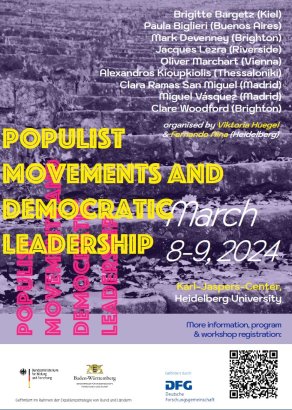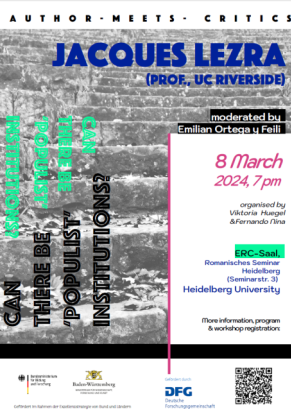Dr. Viktoria Hügel
Kontakt
Ruprecht-Karls-Universität Heidelberg
Institut für Politische Wissenschaft
Bergheimer Straße 58
69115 Heidelberg
Aktuelles
INTERNATIONAL WORKSHOP
“POPULIST MOVEMENTS AND DEMOCRATIC LEADERSHIP”
March 8-9, 2024, Karl-Jaspers-Centre, Heidelberg University
Organised by Viktoria Huegel and Fernando Nina
The international and interdisciplinary workshop Populist Movements and Democratic Leadership addresses the figure of the leader as part of a cultural narrative that understands authoritarian intervention to be necessary to re-instate order in times of crises. Worldwide we can observe political leaders use “populist strategies” to undermine vital democratic institutions and procedures in the name of “the people”. However, in South America and the South of Europe especially, leadership figures are part of a cultural imaginary that associates populism with democratic movement struggles for peasant, migrant and indigenous justice, redistribution of wealth and greater access to services. The aim of the workshop is therefore to a) to explore the potential and limitations of democratic leadership for social transformation, and b) scope out to what extent “the flight” toward leaders constitutes part of a cultural shift toward authoritarian society (Fromm 1969). For that, it brings together scholars working on social transformation and political movements, specifically experts on populist politics in Latin America and Southern Europe, with scholars exploring the figure of the leader as represented in the cultural imaginary (including literature and aesthetics).
Speakers:
- Brigitte Bargetz (Kiel University, Germany)
- Paula Biglieri (University of Buenos Aires, Argentina)
- Mark Devenney (University of Brighton, U.K.)
- Jacques Lezra (UC Riverside, U.S.)
- Oliver Marchart (University of Vienna, Austria)
- Alexandros Kioupkiolis (Aristotle University, Greece)
- Clara Ramas San Miguel (Complutense University Madrid, Spain)
- Miguel Vásquez (Complutense University Madrid, Spain)
- Clare Woodford (University of Brighton, U.K.)
If you would like to attend, please register with Viktoria Huegel: viktoria.huegel@univie.ac.at
There is a limited number of places available at the venue. Please only register if you are planning to attend both days. The workshop does not entail traditional presentations, instead the speakers will share draft papers of approx. 2000 words before the workshop. All participants are expected to prepare the material for the discussion.
March 8, 2024; 7pm
Autor-Meets-Critics
Prof. Jacques Lezra (UC Riverside) on "Can there be ‘Populist’ institutions?"
Moderated by Emilian Ortega y Feili
Location: ERC-Saal, Romanisches Seminar Heidelberg (Seminarstr. 3)
This event is open to all and does not require registration.
Abstract:
"What is the robbing of a bank, ein Einbruch in eine Bank," Brecht's Macheath asks, "compared to the founding of a bank, gegen die Gründung einer Bank?" A populist institution may be an institution tending to the interests of a "people," or one intended to produce a "people," or one, whatever its end, founded by a "people." On the classic definition, "institutions" create and administer proper objects, identities, and relations; provide repeatability and predictability (that is, they make social time calculable); set the borders of their competency; police themselves, within those borders, with regard to the propriety of their objects, identities, and relations. Are these classic qualities of the institution compatible with the notion of the "people"? What sort of class term does "people" have to be, if it is to be compatible with the classic institution? Who or what has the power of foundation, Gründung, of a "popular" institution? And if the two are incompatible, what modifications of each term--the "people," the "popular," the "institution"--are required in order to produce democratic forms of governance? I'll turn to work by Schulze-Delitzsch, Tönnies, Gierke, Laclau, and Lefort, and to the cases of 19th-century "community" businesses--like communal banks, Vorschussvereine, Volksbanken and Genossenschaften --to make my argument.





